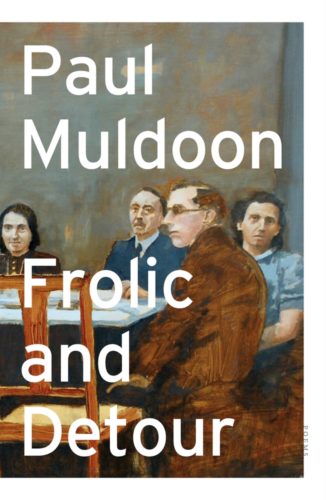Poetry Review: Paul Muldoon’s “Frolic and Detour” — Making the Intricate and Difficult Seem Easy
By David Gullette
Frolic and Detour contains a few poems that I judge to be instant classics of English-language poetry.
Frolic and Detour by Paul Muldoon. Farrar Strauss Giroux, 144 pages, $25.
 I confess I’ve taken Paul Muldoon for granted in recent decades, have read the occasional poem in Ploughshares or The New Yorker, but haven’t sat down to work through an entire collection of his poems. Big mistake. That has now changed with the arrival of Frolic and Detour, which contains poems from 2015 to the present, including a few that I judge to be instant classics of English-language poetry.
I confess I’ve taken Paul Muldoon for granted in recent decades, have read the occasional poem in Ploughshares or The New Yorker, but haven’t sat down to work through an entire collection of his poems. Big mistake. That has now changed with the arrival of Frolic and Detour, which contains poems from 2015 to the present, including a few that I judge to be instant classics of English-language poetry.
Take “Encheiresin Naturae,” a smooth, stunning reimaging of harvest time for wheat somewhere in Northwestern Ireland, in 15 stanzas that turn out to be 15 of the most elegant sonnets you can imagine, in a hybrid format — octaves of ABAB CDCD followed by sestets of EFG EFG. This begins to explain why Nick Laird calls Muldoon “the most formally ambitious and technically innovative of modern poets.” But only begins. The last word of each sonnet/stanza is repeated (or echoed) in the first line of the next sonnet/stanza. And certain words/ideas keep popping up in the sequence: pigs, pegs, doors. In fact the barn door is wrested off its jambs in the first line of the sequence, but we only discover why in the final sonnet/stanza. We are also treated to a sprinkling of odd and archaic and even regional sort-of-English words, as so often happens in a Heaney poem. Here we come upon brangle, stooks, halberd, hauberks, scurf, hames, withie, clegs, felloes, besomed. . . But this all takes place in an easy flow of language that feels like regular spoken English: We flailed away at wheat sheaves that were bound/ with straw ropes and stacked/ against the future; or: Our two-roomed cabins were thrown up in the spring/ in a matter of days; or Despite the pact/ between us, God’s advances/ were mostly unwelcome.
What I’m getting at here, as an American poet raised on a poetry mostly shorn of tradition and gimmicks, is that Muldoon’s formal ambitions and technical innovations in the poem are so unobtrusive and easy to swallow. “The art that conceals art,” it might once have been called. What the Italians call sprezzatura — making the intricate and difficult seem easy.
“Encheiresin Naturae” draws its name from “a technical term in alchemy having to do with the supposed way in which the spirit joints the soul to the body.” More simply, it means “manipulating nature.” Goethe uses it in Faust. In Muldoon’s hands, it becomes mildly ironic, since a “famous poet” (obviously Yeats) “commonly used his Oiuja board/ to conjure spirits where they threshed/ upon the threshold of this world.” But for the people doing the actual threshing in the poem, this spiritualist mumbo-jumbo “went right over our heads like a partridge/ taking off over the barn before once more falling hard.” And yet a thread of near mysticism links these Irish threshers and their wooden cart with an Egyptian chariot that “would convey/ a king to the other side, along with his nest egg/ of gold, hawks, combs, beer, a ration of wheat per day// forevermore.”
The poem appeared in a deluxe edition of 50 copies ($5,700 a pop!) with 15 engravings by Barry Moser, published by Nawakum Press in Santa Rosa CA. They must have sold some copies, but lament the “Remaining Copies Lost to the October 9, 2017 Sonoma County Firestorm.”

Poet Paul Muldoon. Photo: Princeton.edu.
By the way, the barn door that was wrested off its jambs at the start of the poem returns in the final sonnet, doubling as a threshing floor. The remnant straw will “thatch/ our mud-walled cabins the following spring” and the wheat itself make “bread for a wake- or wedding-fling.” But at the end of the long day the door will turn into a dance floor and afford “a slack-jowled farm boy the chance to win/ one of the girls who’d shown, and shaken, their legs// and danced their hearts out on its sounding board.” But not before Ted Burke has “dusted off his violin/ and, one by one, tightened the tuning pegs.”
I can only say that for me, it’s one of the best poems so far of the new century.
The rest of the book has some real gems, like “Belfast Hymn,” that celebrates that coming-alive-again old city’s legacies of commerce and poetry (and names the poets!), a series of World War I poems, tributes to Robert Lowell, C. K. Williams, Leonard Cohen, and Bruce Springsteen, and a grand finale, the title-poem “Frolic and Detour” — tuned to the tink tink, tink tink of a house wren:
Just as, at the Black Cat Café and Bakery,
Tony Dauo offers “Thanksgiving Sandwiches” all year round, so wren-music
offers druids a permanent link between
this world and the one nearby.
Do yourself a favor: go out to the Grolier and buy yourself this book.
David Gullette was an early editor of Ploughshares, and is Literary Director of the Poets’ Theatre. His poems are collected in Questionable Shapes (Cervena Barvá Press).

David, thanks so much for your review! What a terrific poet, Muldoon. It’s wonderful to hear your voice, too, in praise of this collection. I am looking forward to reading the volume, but a more affordable one. Gail Mazur reminded us of on the anniversary of JFK’S death: “power corrupts, poetry cleanses.”